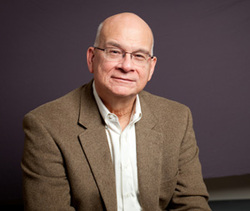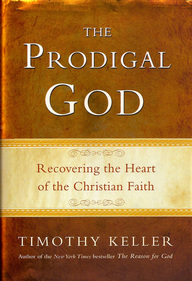The Prodigal God, by Timothy Keller
A Study Guide developed by Lee Magness

Timothy Keller (1950- ) preaches at the dynamic Redeemer Presbyterian Church in Manhattan. His ministry there has guided the congregation to exponential growth. He has walked a conservative path in the Presbyterian Church of America, while avoiding fundamentalist positions. This deliberate tightrope walk has opened Keller to both acclaim and attack. One of his goals is to present a reasoned approach to faith in God for his upper-middleclass. post-modern congregants. Another goal to present the love of God in a winsome way emerges in his highly acclaimed work,
The Prodigal God.
Although it is no substitute for reading the book, you might also want to watch and listen to a live 45 minute video presentation of this material by clicking here.
The Prodigal God.
Although it is no substitute for reading the book, you might also want to watch and listen to a live 45 minute video presentation of this material by clicking here.

Reading Timothy Keller's The Prodigal God (Dutton, 2008) will change the way you read the parable of the Prodigal Son, it will change the way you respond to the parable, and it might even change the way you live your life.
Here are some questions that I hope will guide your experience of reading this wonderful theological resource:
Introduction
1) Why do we usually call this parable the Prodigal Son or the Lost Son, when Jesus puts the initial focus on the father? What is the significance of the way Jesus opens his parable?
2) Even though we use the word all the time in the title of this parable, most of us don't know the meaning of the word "prodigal." What does it mean?
Chapter 1 ~ The People Around Jesus
1) According to Luke 15.1-3, who were the 2 different groups interacting with Jesus?
2) What were the 2 different responses of these 2 different groups?
3) What were Jesus' 2 different reactions to these 2 different groups?
4) What were the 2 different sins of these 2 different groups?
5) How would you explain the fact that Jesus "welcomes sinners" but also cares about Pharisees?
Chapter 2 ~ The Two Lost Sons
1) What/who is the subject of Act 1? What are the main "scenes" in Act 1?
2) How did the younger son shame his father?
3) How was the younger son "prodigal"? How was the father "prodigal"?
4) What would have been wrong with ending the parable with the return of the younger son?
5) How did the older son shame his father?
Chapter 3 – Redefining Sin
1) How were the sins of the younger and older sons different?
2) How were the sins of the two sons in a sense the same?
3) Why was the younger son reconciled to the father but the older was not?
4) What do we learn from this parable about the nature of human sin?
Chapter 4 – Redefining Lostness
1) What was the purpose of Jesus' ministry?
2)In what sense was the younger son "lost"?
3) In what sense was the older son "lost"?
4) Do you agree with Keller's definition of the older son's "lostness"?
5) What three aspects of prayer does Keller explore?
Chapter 5 – The True Elder Brother
1) What was the father's reaction to both brothers?
2) What is the nature of true repentance?
3) What is Keller's point about the fact that there is a seeker in the parables of the sheep and coin but not here?
4) Who does Keller think should have served the role of seeker?
5) How might Keller risk taking the focus off the person and mercy of the father by emphasizing this point?
Chapter 6 – Redefining Hope
1) What according to Keller is the theme of the Bible and the experience of the human psyche?
2) Where else do you see this theme played out in the Bible?
3) Do you agree that this is the great longing of the human psyche?
4) In the light of this theme, what is the role of Jesus?
Chapter 7 – The Feast of the Father
1) What is the nature of salvation?
2) How is it like a "feast"?
3) Where are the "communal" features of parable of the Prodigal Son?
Here are some questions that I hope will guide your experience of reading this wonderful theological resource:
Introduction
1) Why do we usually call this parable the Prodigal Son or the Lost Son, when Jesus puts the initial focus on the father? What is the significance of the way Jesus opens his parable?
2) Even though we use the word all the time in the title of this parable, most of us don't know the meaning of the word "prodigal." What does it mean?
Chapter 1 ~ The People Around Jesus
1) According to Luke 15.1-3, who were the 2 different groups interacting with Jesus?
2) What were the 2 different responses of these 2 different groups?
3) What were Jesus' 2 different reactions to these 2 different groups?
4) What were the 2 different sins of these 2 different groups?
5) How would you explain the fact that Jesus "welcomes sinners" but also cares about Pharisees?
Chapter 2 ~ The Two Lost Sons
1) What/who is the subject of Act 1? What are the main "scenes" in Act 1?
2) How did the younger son shame his father?
3) How was the younger son "prodigal"? How was the father "prodigal"?
4) What would have been wrong with ending the parable with the return of the younger son?
5) How did the older son shame his father?
Chapter 3 – Redefining Sin
1) How were the sins of the younger and older sons different?
2) How were the sins of the two sons in a sense the same?
3) Why was the younger son reconciled to the father but the older was not?
4) What do we learn from this parable about the nature of human sin?
Chapter 4 – Redefining Lostness
1) What was the purpose of Jesus' ministry?
2)In what sense was the younger son "lost"?
3) In what sense was the older son "lost"?
4) Do you agree with Keller's definition of the older son's "lostness"?
5) What three aspects of prayer does Keller explore?
Chapter 5 – The True Elder Brother
1) What was the father's reaction to both brothers?
2) What is the nature of true repentance?
3) What is Keller's point about the fact that there is a seeker in the parables of the sheep and coin but not here?
4) Who does Keller think should have served the role of seeker?
5) How might Keller risk taking the focus off the person and mercy of the father by emphasizing this point?
Chapter 6 – Redefining Hope
1) What according to Keller is the theme of the Bible and the experience of the human psyche?
2) Where else do you see this theme played out in the Bible?
3) Do you agree that this is the great longing of the human psyche?
4) In the light of this theme, what is the role of Jesus?
Chapter 7 – The Feast of the Father
1) What is the nature of salvation?
2) How is it like a "feast"?
3) Where are the "communal" features of parable of the Prodigal Son?
